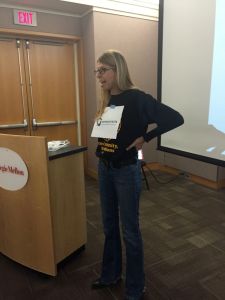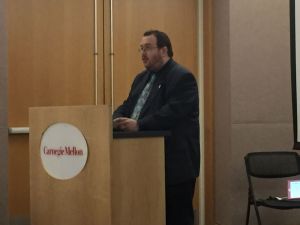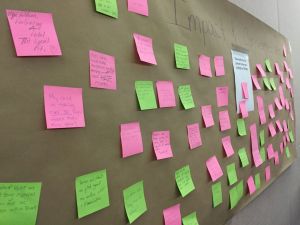In case you missed the Test-In on Saturday, here’s your cheat sheet. We learned so much from the principals and teachers who spoke with us. And from the parents and students who shared their experiences with high-stakes-testing. Even the Post-Gazette attended. [Post-Gazette, 3-22-15] Be sure to study these class notes – there will be a test!
The event started with over 50 people answering sample questions from the PSSAs and Keystone exams. Following standard testing protocols, all the student work and art on the walls had been covered in brown paper (which will remain up for the next four weeks); participants had to hand over their mobile phones and sit behind testing screens to prevent cheating; and several actual teachers (who have to pass a test on how to give these tests) walked around the dead-silent room answering questions with the only thing they are allowed to say, “I can’t answer that. Please read the question.”
When one test-taker got sick and “threw up” on her test (OK, this was only a dramatization, but it happens to kids), Yinzercation steering committee member Pam Harbin pulled on rubber gloves and explained that there is a protocol for this: the test must be collected, placed in a plastic bag, and then the answers transferred to another sheet so they can be scored, of course. Ick! Ms. Harbin kindly distributed the test answers at the end of the Test-In, but explained that in real life, students do not get their results back until the following year. In addition, teachers are never allowed to see the tests and neither teachers nor students ever learn what they actually got wrong so they can learn from their mistakes.

Yinzercation Steering Committee member Pam Harbin as the PA Department of Education explains testing procedures.
After all the test-taking, Dr. Greg Taranto, Pennsylvania’s 2012 Middle School Principal of the Year and a member of Gov. Wolf’s education transition team, explained four big concerns he has with the use of high-stakes tests. This is what he is seeing in our schools:
- Over testing. He said, “Too many tests are consuming mass amounts of instructional time.” The result is a narrowing of the curriculum, as schools add additional periods in tested subjects and cut back or eliminate non-tested areas such as the arts, social studies, and physical education.
- Over reliance. High stakes tests have become “the end all, be all for determining if a school is successful or not.” Dr. Taranto has serious concerns about the validity of these tests. For example, the testing company actually uses temp workers to grade the open-ended items on the tests. Another teach pointed out that testing companies advertise on Craig’s List and that graders need only have a bachelor’s degree (not a teaching degree or any teaching experience).
- Cost. There are huge costs to taxpayers as well as school districts. Dr. Taranto explained that the state is spending $58 million this year just to administer the tests (and that doesn’t include test development or other costs). What’s more, students lose the guidance counselor at his school for over a month because he is the staff member assigned to test administration.
- Student data tracking. Dr. Taranto also expressed concerns with the way that testing companies are tracking an enormous amount of information on our students, from test scores to even discipline data on children. He noted that, “This is not disclosed to parents” and asked, “Who has access to this information? Who will have access to this information down the road?”
Dr. Taranto closed by saying, “My fear is we now have a generation of new parents and teachers coming about who think that this is what school is all about — narrowed curricula, test prep and taking all these standardized tests in the spring every year. The bottom line is: everything that is emphasized in schools now ties back to standardized testing.”

Pittsburgh teacher Jon Parker gives heart-wrenching examples of how high-stakes-tests are hurting his students.
Parents then heard from Jon Parker, an English teacher at Pittsburgh Allderdice high school, who began by explaining the first assignment he gives each year. He asks his students to write him a letter introducing themselves. In his class of struggling readers this year, over half of the students included their most recent PSSA rating as part of their introduction. They literally said things like, “I’ll work hard but I’m below basic.” Mr. Parker fears that “students’ self-worth is becoming inextricably tied to scores on high stakes tests.” Listen to his powerful explanation:
“So the tragic message from our high stakes test environment is ‘you are your score.’ And if we tell a student he’s below basic regularly from the time he’s in kindergarten, what else would we expect of him? One of the stated goals of No Child Left Behind was to combat the “soft racism of low expectations.” But instead it has created a vicious cycle of self-fulfilling prophecies. “You have failed in the past; you will fail forever.” I cannot imagine where I would be if I had that school experience, but I can guarantee you I wouldn’t be here.
“Besides the destructive linking of test failure to personal failure, districts regularly use assessments like Keystones, PSSAs, SRIs, Dibels, and a litany of other acronymed atrocities to exclude students from high quality courses and programs. I have a student this year, one of the most well-rounded and motivated students I’ve ever had, who will be excluded from taking gifted math and science courses next year. Her current averages in both those subject areas are in the high 90s. Her GPA last semester was a 4.0. Teachers universally agree that work ethic is the most important predictor of success in challenging classes. And she would do the work. But instead, though she has the desire, the skill set, the support, she doesn’t have the score. This is bad policy in Pittsburgh, but I can assure you that instances like this happen every day across our state. So we have a young female student of color who wants to take challenging math and science courses. … And high stakes testing is literally the only barrier to her enrollment.
“Finally, I’d like to take a massive intellectual leap here and ask you to assume for a second that our tests have some validity in indicating of which students need support so that we can help them. That’s the reason most testing advocates cite. We need consistent data so we can support students who need it. But ultimately what happens in many schools is that administrators and teachers create lists of “bubble students.” These are students who are close to passing the Big Tests. And then teachers work with them individually to help them pass the test. Perfect, right?
“But what’s really happening is that the students with the most needs are passed over—they’re not close enough to pass the tests, so they are neglected, perpetuating what has probably been the whole of their educational experience. You’re a failure; you’re not worth our time. Then we wonder why we have such disparity in opportunities, a lack of student or family buy-in, negative attention seeking behaviors (for which we then suspend students).”
Mr. Parker concluded by saying, “high stakes testing has massive negative implications for real students and very few, if any positive outcomes. We must be the voice for our own kids, for our students, and for our schools. What I have described this morning is real life for them. And it is up to us to stand for them and for their future.”

Yinzercation steering committee member and Steel Valley teacher explains why high-stakes-tests do not provide valid information to teachers and why his daughter won’t be taking them.
Last but not least, Mr. Steve Singer, a teacher from Steel Valley and Yinzercation steering committee member, took the floor and shared his recent experience opting his daughter out of testing. His blog piece entitled, “Not My Daughter – One Dad’s Journey to Protect His Little Girl from Toxic Testing,” has gone viral and been shared over 10,000 times in just the past few days. I highly encourage you to read the entire piece, but here’s an excerpt to get you started [Gadfly On The Wall, 3-20-15]:
I’ll admit it – I was scared.
I’m a nationally board certified teacher with a masters degree in education. I’ve taught public school for over a dozen years. But I’ve only been a daddy for half that time.
Would making this call get my little girl in trouble?
I didn’t want to rock the boat. I didn’t want my daughter to suffer because her old man is making a fuss. I didn’t want her teachers and principal giving her a hard time because of something I did.
But I couldn’t deny what I know.
Standardized testing is destroying public education. It’s stressing kids out by demanding they perform at levels they aren’t developmentally ready to reach. And its using these false measures of proficiency to “prove” how bad public schools are so they can be replaced by for-profit charters that will reduce the quality of kids’ educations to generate profits.
No. There was no doubt about it. I had to make this phone call.
I used my most professional voice on the line with the principal.
“Hi, Mr. Smith. This is Steven Singer. I’m Amy’s father. I know she’s just in kindergarten but it’s come to my attention she’s taking standardized tests, and I’d like to opt her out.”
Before my little girl started school, I hadn’t even realized there were standardized tests in kindergarten. She takes both the DIBELS and the GRADE test. … When taking the DIBELS, the teacher meets with a student one-on-one while the child reads aloud and is timed with a stopwatch. Some of the words the child is asked to read make sense. Some are just nonsense words. The test is graded by how many words the child pronounces correctly in a given time period.
“My concern is that the test doesn’t assess comprehension,” I said. “It rewards someone who reads quickly but not someone who understands what she’s reading.
“Moreover, there is a political side to the test since it’s owned by Rupert Murdoch. Cut scores are being artificially raised to make it look like more students are failing and thus our schools aren’t doing a good job.
“Finally, focusing on pronunciation separate from comprehension narrows the curriculum and takes away time from proven strategies that actually would help my daughter become a better reader.” …
Again, be sure to read Mr. Singer’s entire piece to get the full impact of his powerful message. But you get the point: our Test-In presenters all agree that there are major problems with high-stakes-testing. They are being over-used and mis-used. They are not valid measures of student learning. They are costing a fortune at a time when schools are struggling for basic resources. They label students and teachers as failures. They prevent students from accessing programs and opportunities and even prevent students from graduating. They encourage schools to focus on “bubble students” just below the mark, and ignore the most struggling students at the bottom.
To this sad list, parents added dozens more examples of the impact of high-stakes-testing that they have seen on students and schools. In small group discussions, they recorded these consequences on sticky notes, which we will share in a future post. For now, your assignment is to listen to these educators: re-read this crib sheet and bone up for the test!










